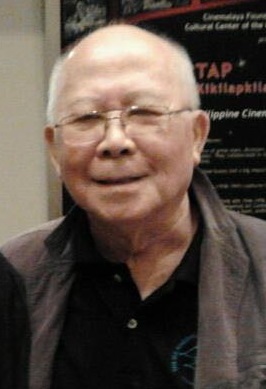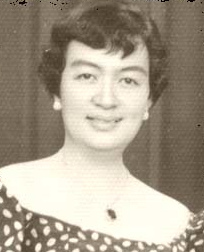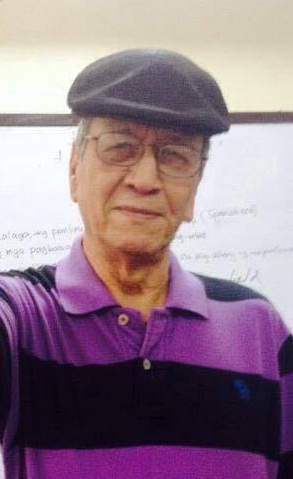Related Research Articles
Francisco "Franz" Arcellana was a Filipino writer, poet, essayist, critic, journalist and teacher.

Bienvenido L. Lumbera was a Filipino poet, critic and dramatist. Lumbera is known for his nationalist writing and for his leading role in the Filipinization movement in Philippine literature in the 1960s, which resulted in his being one of the many writers and academics jailed during Ferdinand Marcos' Martial Law regime. He received the Ramon Magsaysay Award for Journalism, Literature and Creative Communications in 1993, and was proclaimed a National Artist of the Philippines for literature in 2006. As an academic, he is recognized for his key role in elevating the field of study which would become known as Philippine Studies.
Fidel Doloreto Rillo Jr. is a Filipino writer and book designer.

Liwayway A. Arceo was a multi-awarded Filipina fictionist, journalist, radio scriptwriter and editor from the Philippines.

Gémino Henson Abad is an educator, writer, and literary critic from Cebu, Philippines. He is a National Artist for Literature of the Philippines.
Teo Antonio is a Filipino poet. He was born in Sampaloc, Manila. He was educated at the University of Santo Tomas where he studied Fine Arts. Antonio is the son of Emilio Mar Antonio, hari ng balagtasan during the 1950s.
César Ruiz Aquino is a Filipino poet and novelist. He was born and raised in Zamboanga, Philippines. He was educated at Silliman University, at UP Diliman, at the Ateneo de Manila on Padre Faura, and at AE. His writing career began when Philippine Graphic published his story 'Noon and Summer' written in 1961. At age 19, he received an invitation to - and a virtual writing fellowship at - the first, 1962, Silliman National Writers Summer Workshop in Dumaguete that included as fellows Wilfrido D. Nolledo, Jose Lansang Jr. and Wilfredo Pascua Sanchez - as well as mentors Nick Joaquin, Franz Arcellana and Edilberto Tiempo and Edith Tiempo.
Onofre R. Pagsanghan is a teacher, playwright, and stage director from the Ateneo de Manila High School, Philippines. An Ateneo alumnus himself, Mr. Pagsi—as he is fondly called by students and colleagues—began his teaching career in his alma mater in 1951. He taught Latin, English, and Filipino to high school students over several decades. In addition, he is also the moderator of the theater group Dulaang Sibol, which he founded in 1956. Before he officially retired in 2020, he received numerous awards in the fields of teaching and theater.
Leoncio P. Deriada was a Filipino writer and professor emeritus of creative writing and literature at the University of the Philippines in the Visayas in Iloilo.

Rogelio Lunasco Ordoñez also known as Ka Roger, was a multi-awarded Filipino fiction writer, poet, activist, journalist and educator. He was one of the authors of the iconic Tagalog literature anthology Mga Agos sa Disyerto in the 1960s. He was a contributor to Liwayway Magazine, Pilipino Free Press, Asia-Philippines Leader, Pilosopong Tasyo, Diario Uno and Pinoy Weekly.
Ave Perez Jacob is a Filipino writer, columnist, literary critic and novelist popular for his socio-political works. He was one of few Tagalog writers who popularized short stories with theme of injustice and tragedy set on the realistic portrayal of poverty during the 1960s. His short story "Guwardiya" won a Palanca Awards in 1975. He is also the author of the novel "Sibol sa mga Guho." Prof. Ave Perez Jacob was honored by the Unyon ng mga Manunulat sa Pilipinas (UMPIL) with "2001 Gawad Pambansang Alagad ni Balagtas" for his socio-realist novels and short stories.
Simeon Dumdum Jr. is a former Regional Trial Court Judge in Cebu City, Philippines, and is a published poet. He once studied for the priesthood in Galway, Ireland, but left the seminary to take up law. After years of practicing law, he was appointed Regional Trial Court judge. He won prizes for his poetry, which he has published and read in the Philippines and abroad.
Benigno Juan is a Filipino journalist and a writer.
John Iremil Teodoro is a Filipino writer, creative writing and literature teacher, literary critic, translator, and cultural scholar. He is also considered to be a leading pioneer in Philippine gay literature and the most published author in Kinaray-a.
Ligaya G. Tiamson-Rubin, is a Filipino writer. A multiple Carlos Palanca Memorial Awards for Literature recipient, and currently a professor of the University of the Philippines Diliman. Today, she is teaching Filipino 25, Mga Ideya at Estilo under the Department of Filipino and Philippine Literature at the College of Arts and Letters, University of the Philippines Diliman in Diliman, Quezon City.
Damiana Ligon Eugenio was a Filipino female author and professor who was known as the Mother of Philippine Folklore, a title she received in 1986. Apart from teaching at the University of the Philippines, she has several publications in the field of Philippine folklore, among them a series of seven books which she compiled and edited.
Efren Reyes Abueg is a well-known and recognized Filipino-language creative writer, editor, author, novelist, short story writer, essayist, fictionist, professor, textbook writer, and anthologist in the Philippines. His works appeared on magazines such as Liwayway, Bulaklak, Tagumpay, Mod, and Homelife.
Rogelio Mangahas was a Filipino artist and poet.
Mike Bigornia is a Filipino poet, editor, fictionist and translator. Bigornia was educated at the University of the East where he finished political science.

Nemesio “Totoy” S. Baldesco Sr. is a Filipino poet and pedicab driver from Calbayog, Samar who primarily does literary works in Waray. He is a recipient of Gawad Parangal of UMPIL. He is known as the “Father of Waray Poetry”.
References
- 1 2 3 Unyon ng mga Manunulat sa Pilipinas, The Asia Writes Project, asiawrites.org
- 1 2 3 4 5 6 7 From the CCP Encyclopedia, Volume IX (Literature), page 766 (see About UMPIL)
- ↑ Pantoja-Hidalgo, Cristina (2008). Fabulists and Chroniclers. UP Press. p. 44. ISBN 9789715425865 . Retrieved 4 May 2019.
- ↑ "National Writers Congress tackles PH war on drugs and literature April 29". Rappler. 2 May 2017. Retrieved 4 May 2019.